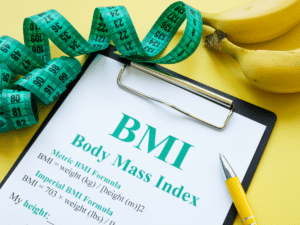Higher weight can actually cause depression, making both obesity and depression significant health concerns that impact an individual’s daily functioning. In fact, approximately 43% of American adults grapple with the dual challenges of obesity and depression, along with related conditions.
Experts have yet to find definitive ways to identify causes or cure depression, making it a highly complex condition. However, they make every effort to treat it effectively. In some cases, depression may result from chemical imbalances in the body, while in other instances, it can be situational. Now, let’s uncover the connection between depression, obesity, or being higher weight.
What Is The Relationship Between Depression And Obesity?
A study by Yale University found a link between overeating and depression. We have all heard the terms “stress eating” or “comfort foods” which are used to describe a scenario where food is used to elevate or change a mood temporarily. The typical types of food consumed by individuals with chronic stress are high-fat and contributing factors to mood disorders and metabolic issues like type 2 diabetes.
An article published by The Anxiety and Depression Association of America (ADAA) reported that people who suffer from obesity experience anxiety and depression more frequently than individuals with a healthy body mass index (BMI) The same study also showed a correlation between unhealthy eating habits and the elevated risk of experiencing anxiety and depression.
Another report revealed that fat cells contribute to depression because they secrete inflammatory cytokines. These are proteins that are distributed in the central nervous system and the immune system. Elevated cytokine levels directly contribute to the creation of mood disorders and depression.
The link between being higher weight and depression has been the subject of many medical studies and articles. This link was further explored in a medical study conducted in Germany which concluded that obesity does contribute to depression. It also discussed how these two conditions (obesity and depression) cause a cyclical effect, feed off each other, and create a bigger problem.
How Can Being Higher Weight Cause Depression?
Higher weight individuals often experience issues in social situations that promote depression. Many are ostracized, stereotyped, or discriminated against because of the way they look. Carrying excess weight and obesity can contribute to various health issues, including joint pain, high blood pressure, and type 2 diabetes. Moreover, these conditions can also result in social withdrawal and mood disorders. Individuals with higher weight are 25% more prone to experiencing mood swings, self-esteem problems, a negative self-image, and feelings of low self-worth.
Generally, people who suffer from depression have many areas of their brain that are less active than individuals who do not suffer from depression which would explain why many depressed individuals are often lethargic and exhausted.
Can Depression Cause Weight Gain?
Higher weight individuals underwent brain scans which revealed a significant impact of their weight on brain regions responsible for regulating appetite and self-control.
Depressed individuals exhibited increased levels of activity in the limbic region of the brain. This is the part of the brain responsible for emotional and behavioral responses, the rewards center, pleasure, and survival. It was also learned that individuals with depression have lower serotonin levels which can cause cravings for carbohydrates.
The University of Maryland School of Medicine conducted a study on teenagers, and the study concluded that depressed young adults are more likely to gain weight due to their unhealthy food choices and lack of physical activity.
When regions of the brain do not function as they should, an individual may become vulnerable to cravings and begin to chronically overeat. This leads to weight gain and creates a vicious cycle of overeating, weight gain, and depression. Another factor that can come into play is that many antidepressants cause weight gain which just exacerbates the existing problem.
How Do I Know If I Am Higher Weight?
In the 18th century, experts developed the body mass index (BMI) to categorize individuals based on their body weight. It is not an accurate measurement of body fat or the health of an individual but a tool that is inexpensive and quick to use as a baseline.
Obesity puts individuals in a higher risk category for heart disease, type 2 diabetes, high blood pressure, sleep apnea, fertility issues, mental health conditions, etc.
Classification categories on the BMI scale run from underweight to higher weight. To find out where you fall on the BMI scale, use our handy BMI calculator.
Which Comes First: Obesity Or Depression?
Regardless of whether being higher weight causes depression or vice versa, there is clearly a link between the two with one influencing the other.
Depression can trigger unhealthy eating habits, which promotes weight gain, which then can trigger feelings of negative self-image, and lead to depression. It creates a downward spiral that is hard to escape.
Signs of depression that are linked to obesity:
- Changes in eating habits: depressive eating, eating unhealthy foods, and sweets, etc.;
- Not getting enough sleep;
- Avoiding physical activity.
What Are Some Signs Of Depressive Eating?
Depressive eating is just what it sounds like, eating because you are depressed. Eating to gain emotional relief, and not because one is hungry, causes overeating and weight gain because there is never a feeling of satisfaction. Some signs of depressive eating include:
- Eating large amounts of food;
- Finding it difficult to stop eating;
- Feeling no satisfaction after eating;
- Not enjoying eating, feeling numb, emotionally removed, or mindless while eating;
- Feelings of depression or self-loathing after eating.
Higher Weight Causes Depression. How Can It Be Treated?
There are different ways of treating individuals for depression because they are higher weight. Different factors must be taken into consideration when choosing the proper treatment for each individual. These factors may include the underlying cause of their eating, environmental factors, and lifestyle choices that add to their weight problems.
Some individuals may benefit from Cognitive behavioral therapy (CBT) while others can benefit from an assisted weight loss program or a combination of both.
Medically-Assisted Weight Loss For Treating Obesity May Help Relieve Depression
Optimize your weight loss journey with effective options like bariatric surgery or a non-surgical alternative. These procedures aid individuals who struggle with obesity or carry excess weight, promoting weight reduction and a potential decrease in depression symptoms.
Losing weight independently can be challenging. By choosing a doctor-supervised plan, you gain access to continuous support, nutritional guidance, exercise coaching, and valuable mental health resources.
Bariatric Surgery
Bariatric surgery aims to assist individuals with higher weight in achieving weight loss. This procedure typically removes approximately 75% of the patient’s stomach to limit their food intake per meal. Additionally, certain bariatric surgeries involve restructuring the digestive system to prevent the body from absorbing all nutrients and calories consumed. Transition words such as “typically” and “additionally” help improve the flow of the information provided while maintaining an active voice.
Bariatric surgery is very effective in promoting weight loss. Patients must meet specific qualifications before they can undergo bariatric surgery. Bariatric surgeries include gastric sleeve surgery, gastric bypass surgery, and duodenal switch surgery.
Non-Surgical Weight Loss Procedures
For patients who do not wish to undergo surgery or who do not meet the qualifications for bariatric surgery, an endoscopic weight loss procedure may be an excellent option. There are no incisions and no hospital stays required for these endoscopic procedures and they offer very short recovery times.
Orbera Balloon
The Orbera balloon assists in weight reduction by temporarily placing a weight loss device in the stomach. By inserting and inflating the balloon using an endoscope, it occupies a significant portion of the stomach’s capacity.
Over a six-month period, the balloon increases patients’ ability to consume fewer calories and extends their feeling of fullness, resulting in effective weight loss. In addition, our treatment is further optimized through the implementation of a comprehensive 12-month program. This program actively monitors patients’ progress and provides personalized support, effectively enhancing the overall results. Moreover, the program specifically guides individuals in adopting healthier habits, which are crucial for achieving and sustaining their desired weight loss goals.
Endoscopic Sleeve Gastroplasty (ESG)
ESG is a non-surgical weight loss procedure that most higher weight patients can qualify for. During ESG the surgeon makes the patient’s stomach 75% smaller by reshaping it and holding it in place with sutures. We complete the procedure endoscopically from the inside, eliminating the need for any incisions.
The smaller stomach controls the amount of food an individual can eat and they feel satisfied longer. ESG offers comparable weight loss results to gastric sleeve bariatric surgery but since it is non-surgical, the recovery is much faster. Patients have reported weight losses of over 100 pounds after undergoing the ESG procedure.
Losing Weight Can Help With Depression
As we have learned, excess weight can cause many physical and mental health issues. Losing weight can have a positive effect on every aspect of an individual’s life. Losing weight can help lower stress levels, promote better sleep patterns, improve mobility, send type 2 diabetes into remission, lower risks for many serious diseases, and more.
Obtaining a healthy BMI can also boost an individual’s energy level and balance out the elements in the brain that help control depression. Losing weight can also help depression in the following ways:
- Boost the individual’s confidence level;
- Improves their self-esteem;
- Helps to stabilize mood swings;
- Individuals gain a better self-image that improves their quality of life.
According to a study by the Society for the Study of Ingestive Behavior, losing 8% of body weight can have evident effects on depression symptoms. In this behavioral weight loss study, depressed patients who achieved this target experienced significant improvements in their depression symptoms. This study shows improved insulin, cholesterol, glucose, and blood triglyceride levels, linked to heart disease and stroke risks.
If you are higher weight and suffer from depression because of your weight, IBI Healthcare Institute can help! Set up a consultation today to learn more about the different weight loss options we offer. Our team of professionals supports you every step of the way on your weight loss journey and does everything possible to ensure you succeed. Contact us today to begin a healthier happier life!









